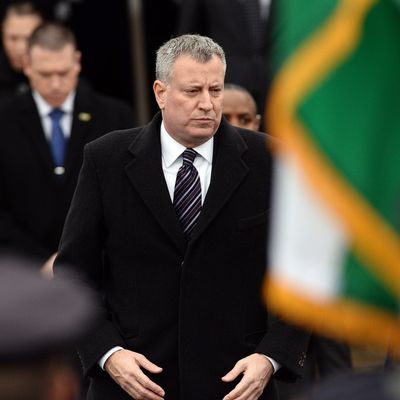
So Bill de Blasio and Bill Bratton win, and Al Sharpton and Pat Lynch lose. We now return you to your regularly scheduled programming.
There’s no doubt that the Quinnipiac poll numbers released yesterday are a boost to the mayor and the police commissioner. According to Thursday’s Q poll, 69 percent of voters disapproved of the cops who turned their backs on the mayor; a record low 29 percent have a favorable view of Sharpton, and a mere 18 percent like Lynch.
Set aside, for the moment, the professional political class’s long-standing dubiousness about the methods and accuracy of the local public polling outfits. These kinds of margins are impossible to dismiss, and appear to vindicate de Blasio’s low-key, high-road strategy in dealing with the NYPD crisis.
Yesterday’s top-line numbers were an undeniable rout. Today’s Q poll, though, is more troublesome for de Blasio: His overall job approval rating is stuck below 50 percent. Yet the most important thing to remember is that each of these players cares most about narrower constituencies — something reflected, on both days, by the alarming racial stratification in the results.
Sharpton, of course, has proven impervious to broad public opinion. For 30 years. In fact, mainstream scorn has only made him stronger, and the Rev retains his solid backing with black poll respondents. Not that he’s running for anything.
Lynch is indeed up for reelection this year, for a fifth term as the PBA’s president. There’s clearly some rank-and-file weariness with Lynch’s tough-guy approach, but just how much is difficult to gauge — the PBA is an opaque operation in the best of times, and its membership has become much more diverse over the past decade. “He doesn’t have a contract to wave around and say, ‘I got you an extra 2 percent,’” says a political strategist who has dealt with the police unions. “So this is what Lynch has for his reelection: ‘I took on fucking de Blasio. I took on Sharpton. I made the editors of the papers talk about the great job we do. I’m your guy.’ And he’ll win. But who around the mayor understands anything like that about the city?”
Which touches on the crucial question in all this: What lessons does Team de Blasio take from not just the public polls — and its own internal polls — but its experience of the cop controversy? Does it embolden the mayor to double-down on playing to his base, a calculation that makes numerical and electoral sense, but seems to be fueling a growing racial and class divide? Or does de Blasio extend his recent rhetorical balance — refusing to apologize for his “fundamental beliefs” on the one hand while sternly denouncing extremist anti-cop protestors as “sick” on the other — into a more balanced approach to policy?
The mayor’s words will continue to be significant. But his executive actions will take on more weight. Because even though the past month has helped de Blasio with most of his Democratic primary coalition, the rancor in the streets and the wrangling with the cops has fed doubts among white liberals and middle-class New Yorkers of every hue. Plenty agree with the mayor’s social goals but dislike the racial split that’s been enlarged by de Blasio’s “tale of two cities” agenda. Others question whether de Blasio can competently manage city government — and things like Wednesday’s crash of the municipal I.D. computer system don’t help.
There’s plenty of time for de Blasio to quell the uneasiness. But it will take substance, not surveys, if he wants to lead the larger city effectively and with a semblance of unity.





























